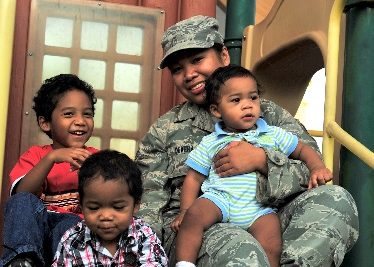A Family Care Plan is a way to make sure that a military family is taken care of while their service member is gone. They may be gone because they are deployed, on temporary duty, or due to other military obligations.
The plan is made up of written instructions and legal documents and helps with a smooth change of responsibilities to the appointed care provider when a service member leaves for a period of time. The Family Care Plan, and any attached documentation, is filed by the service member with his or her commander.
Military families who have children with special needs may consider creating a Family Care Plan to ensure that the family has “back up” in case of emergency.
Why is a Family Care Plan Important?
Military children sometimes need to live for a while with an extended family member or legal guardian. The most common reason for this is that the service member is a single parent, or the parents are both in the military. A Family Care Plan can make certain that children have necessary support when their parents are deployed or otherwise assigned away from their current installations.
Parents of a military-connected child with a disability can write a Family Care Plan to help the child’s care provider understand a child’s IEP, including accommodations and modifications, who is on the IEP team, what each team member contributes, and who to contact at the school if difficulties come up. Parent Center staff can help parents by suggesting ideas and items to include in the Family Care Plan.
The Interstate Compact offers provisions for a child to attend the same school as the one in which he or she was living even when the child moves to stay with their care provider. These provisions should be considered in developing a Family Care Plan.
Which service members are required* to have a Family Care Plan?
Members of the armed forces who are:
- Single parents who have custody of children who are under 19 years old
- Single service members who are pregnant
- Military couples, also called “dual military” with custody of children who are 19 years of age or younger
- A servicemember who is the sole caregiver of another person, such as a service member with an injured spouse, one with a chronic illness, or who is otherwise unable to care for dependents.
- Servicemembers with a family member who speaks little or no English. This family member may be unable to drive and get access to basic resources.
While not required, it’s a good idea for a servicemember’s spouse to also have a plan should the spouse who is caring for children become unable to do so.
What are the basic requirements for a Family Care Plan?
- Each branch of service has its own requirements for a Family Care Plan, but all will all contain the same basic information. At a minimum, a Family Care Plan will include both a short-term and a long-term plan and a designated care provider.
Military OneSource recommends including the following elements:
- Child care guidance: expectations and schedules for child care, school and extracurricular activities
- Medical care information: medications, allergies and doctors’ appointments
- Parenting responsibilities and challenges: guidance on food preferences and restrictions, bedtime, discipline, religious observances and activities, social and leisure activities, safety precautions, allowances and spending, and other issues
- Contact information: phone numbers, emails, and addresses for friends and relatives, health care and other service providers and community resources
- Important documents:Updated copies of your will, life insurance policies, birth certificates and beneficiary information
- Finances:information on how family finances will be managed
- Alternative caregiver: Name and contact information of an alternate caregiver
It’s important to include the care giver in the process of making the plan—he or she may request that specific information be added.
A Short-Term Care Plan outlines how family members will be cared for while the servicemember is gone for less than 30 days. The designated care provider must be:
- A civilian (non-military person),
- Must live in the local area, and
- Must sign a copy of the Family Care Plan
A Long-Term Care Plan details who will care for a servicemember’s children if they are gone for more than 31 days. This is the plan used in the case of deployment, extended training, or involuntary recalls.
The only difference between the criteria for a long-term care provider and a short-term care provider is that the long-term care provider does not have to live in the local area.
Naming a care provider is needed for both the short-term and long-term care plans. Additional information that can be very helpful to include is other family members, tips on running the household, schedule details while the child is in their care, routines, contact information and anything else that will be helpful for your child.
How can a service member update their Family Care Plan?
Service members need to update the Family Care Plan annually to keep it current and assure it’s ready if needed. Some key areas to check for possible revisions include the preferred care provider, medical care, addresses and contact information, school needs including IEPs, contacts and other resources. The Administration or Personnel Point of Contact (POC) at their unit or command can assist service members in keeping the plans current. Last but not least, service members can take advantage of the legal assistance available at their installation
*Department of Defense (DoD) Instruction 1342.19 states when a Family Care Plan is required. However, each branch of service has its own guidelines.
Resources:
How to Create a Family Care Plan for Caregivers -Military OneSource
Preparing Your Family Care Plan -Military OneSource
Documents for a Deployed Service Member’s Designated Family Caregiver -Military OneSource
Air Force Family Care Certification
Deployment Handbook (Coast Guard)
Download this article as a Word document

